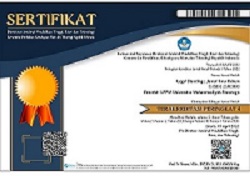Hak Waris Bagi Anak Yang Lahir dari Perkawinan di Bawah Tangan
DOI:
https://doi.org/10.24269/ls.v9i4.11839Abstract
Unregistered marriages (perkawinan siri) remain a common practice within Indonesian society. Although such marriages are considered religiously valid, they hold no legal standing under state law due to the absence of official registration with civil authorities. This lack of legal documentation leads to significant legal issues, particularly regarding the legal status of children born from such unions, including civil rights such as recognition, financial support, and inheritance. This study aims to examine the protection of the rights of children born from perkawinan siri from the perspectives of Islamic law, Christian doctrine, and Indonesian positive law, with the goal of identifying a common ground that ensures justice and child welfare. This research adopts a normative legal method (juridical-normative approach), incorporating statutory, conceptual, and comparative legal approaches. The data used in this study are secondary data, consisting of primary legal materials (laws and court decisions), secondary legal materials (legal literature and scholarly journals), and tertiary legal materials. Data were collected through library research. The data analysis technique employed is qualitative analysis, which involves examining the content and interpretation of relevant legal norms and religious teachings, as well as comparing them to identify alignments or discrepancies in the protection of children’s rights born out of unregistered marriages. In Islamic law, children born from biological relationships are entitled to protection, even if they are born outside of legally registered marriages. Within Christian teachings, perspectives vary across denominations; however, there is a general emphasis on the legitimacy of civil law. Under Indonesian national law, the legal status of such children may be acknowledged as long as the evidentiary requirements prescribed by law such as recognition by the father or a court ruling are fulfilled. This study highlights the critical importance of marriage registration as a form of preventive legal protection, ensuring the clarity of a child's legal status and the fulfillment of their rights. Furthermore, empirical findings reveal a persistent gap in legal awareness among the public and a disconnect between legal norms and their implementation, underscoring the need for active roles by the state and religious institutions in promoting legal education and policy reform.
References
Anshary MK, 2010, Hukum Perkawinan Di Indonesia Masalah-Masalah Krusial, Yogyakarta, Pustaka Pelajar.
Awaliah, A. (2022). Akibat Hukum Pernikahan Siri. Maleo Law Journal.
Bunyamin, A. L. H. (2023). Analisis kebasahan fiqih praktik nikah siri di Indonesia perspektif teori double movement Fazlur Rahman
F.A, Zahro’ul, Kurniawan, B.W, M., Baehaqi, Perlindungan Hak Waris Anak Hasil Perkawinan Siri Menurut Kompilasi Hukum Islam Dan Hukum Positif Indonesia, Jurnal Of Islamic Law And Economics
Hadi, S. (2017). Metodologi research. Yogyakarta: Yayasan Penerbitan Fakultas Psikologi UGM.
Haliah, D. (2016, Juni 30). Nikah sirri dan perlindungan hak-hak wanita dan anak (Analisis dan solusi dalam bingkai syariah). Al-Ahkam Jurnal Ilmu Syari’ah Dan Hukum. http://ejournal.iainsurakarta.ac.id/index.php/al-ahkam/article/view/81
Hadikusuma, H. (2015). Hukum pernikahan Indonesia. Bandung: Mandar Maju.
Idrus Ramulyo, Mohd, 2000, Hukum Perkawinan Hukum Kewarisan Hukum Acara Peradilan Agama Dan Zakat Menurut Hukum Islam, Jakarta, Sinar grafika.
Lubis, K. S., & Simanjutak, K. (2015). Hukum waris Islam. Jakarta: Sinar Grafika.
Mansoba, A. S. (2021). Akibat Hukum Perkawinan Siri Berdasarkan Undang-Undang Nomor 1 Tahun 1974 Tentang Perkawinan: Consequences Of Siri Marriage Law Based On Law Number 1 Of 1974 Concerning Marriage. Jurnal Media Hukum
Maria, F., Irawan, A., & Wati, E. (2023). Perlindungan Hukum Terhadap Anak Yang Lahir Akibat Perkawinan Siri. Jurnal Pendidikan Dasar dan Sosial Humaniora.
Picauly, B. C. (2022). Perlindungan Hukum Terhadap Pekerja Anak. Pamali: Pattimura Magister Law Review
Rofiq, Ahmad, 2000, Hukum Islam Di Indonesia, Jakarta, PT. Radja Grafindo
Salih. (2018). Fara’id fiqhan wa hisaban (Vol. I). Beirut: al-Maktab al-Islamiy.
Sulistiani, S. L. (2015). Kedudukan anak hasil perkawinan beda agama menurut hukum positif dan hukum Islam. Bandung: Refika Aditama.
Suryantoro, D. D., & Rofiq, A. (2022). Hak Mantan Isteri Menolak Rujuk Mantan Suami Menurut Kompilasi Hukum Islam. Ahsana Media: Jurnal Pemikiran, Pendidikan dan Penelitian Ke-Islaman
Sorongan, G. G. (2021, Oktober 21). Kajian yuridis kedudukan hukum anak yang lahir dari hasil perkawinan sirri dalam kaitannya dengan warisan menurut hukum perdata. Lex Privatum, 9(9). https://ejournal.unsrat.ac.id/index.php/lexprivatum/article/view/36569
Syamdan, A. D., & Purwoatmodjo, D. D. (2019). Aspek Hukum Perkawinan Siri Dan Akibat Hukumnya Notarius.
Syarifuddin, Amir, 2004, Hukum Kewarisan Islam, Jakarta, Pradana Media.
Zakaria, E., & Saad, M. (2021). Nikah Sirri Menurut Hukum Islam Dan Hukum Positif. Kordinat Jurnal Komunikasi Antar Perguruan Tinggi Agama Islam
Downloads
Published
How to Cite
Issue
Section
License

Legal Standing : (Jurnal Ilmu Hukum) is licensed under a Lisensi Creative Commons Atribusi-BerbagiSerupa 4.0 Internasional.

.png)

